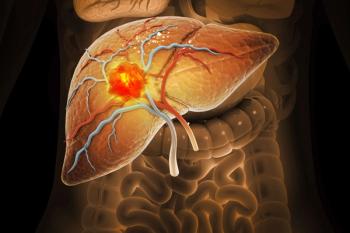
The identification of unique pulmonary fibrosis endotypes is an important step in the development of precision medicine approaches for the incurable condition.

Rose is an editorial director at The American Journal of Managed Care® (AJMC®).
She has a BA in journalism & media studies and Spanish from Rutgers University. You can connect with Rose on LinkedIn.

The identification of unique pulmonary fibrosis endotypes is an important step in the development of precision medicine approaches for the incurable condition.

The investigational therapy for heart failure (HF) with mildly reduced or preserved injection fraction met its primary end point in the phase 3 trial, Bayer announced.

Engaging with healthy lifestyle behaviors, including a healthy diet and physical activity, was associated with better outcomes among patients with multiple sclerosis (MS).

Aravindhan Veerapandiyan, MD, of the Division of Pediatric Neurology at the University of Arkansas for Medical Sciences, discussed the Duchenne muscular dystrophy (DMD) therapy landscape and barriers to treatment access.

Afami-cel, sold as Tecelra by Adaptimmune, is the first gene therapy to be approved for the rare form of cancer and the first FDA-approved T-cell receptor gene therapy.

As pharmacy benefit managers (PBMs) come under increased scrutiny from regulatory agencies, here are 5 things to know about their role in the health care system.

Amit Singal, MD, medical director of the Liver Tumor Program and chief of hepatology at UT Southwestern Medical Center, discusses his research on disparities in hepatocellular carcinoma care in the US.

Researchers analyzed the availability of telehealth services at mental health treatment facilities across the US before and after the end of the COVID-19 public health emergency through a national secret shopper analysis.

Trials of Duchenne muscular dystrophy (DMD) treatments targeting declining lung or upper limb function, which are typically limited to nonambulatory patients, could also include ambulatory patients, according to the study's findings

The authors of the new meta-analysis aimed to provide an update on the association between ankylosing spondylitis and cancer incidence.

Artificial intelligence (AI) models have potential to help clinicians assess risk in patients with hepatocellular carcinoma (HCC) to inform disease management, a new study found.



Although the amount of real-world evidence demonstrating the safety and efficacy of immune checkpoint inhibitors in advanced hepatocellular carcinoma (HCC) has been growing, data on liver function evolution as a prognostic factor for overall survival are lacking.

A literature review plus in-person visits helped identify barriers to quality rheumatoid arthritis care, as well as effective interventions to improve care quality.

Results from a national survey of patients with Duchenne muscular dystrophy (DMD) and their families found that patients and families want to be informed early about endocrine complications associated with glucocorticoid treatment.

While there have been advances in screening technology, it is crucial to continue investing in emerging modalities and to ensure these advancements translate to clinical practice.

Patients with axial spondyloarthritis who took part in exercise therapy showed improvements in disease activity and symptoms compared with patients who did not, a meta-analysis found.

Both appendicular lean mass and fat mass index accounted for unique variance in motor function after controlling for age in patients with Duchenne muscular dystrophy (DMD).

Pain improvement was associated with remission or low disease activity in patients undergoing treatment for rheumatoid arthritis, a study found.

The addition of PD-1 inhibitors to first-line treatment with transarterial chemoembolization (TACE) plus lenvatinib for hepatocellular carcinoma (HCC).

Preexisting spinal damage and higher levels of inflammatory activity at baseline were linked with radiographic progression in axial spondyloarthritis treated with biologic disease-modifying antirheumatic drugs over 2 years regardless of treatment type.

Bimekizumab demonstrated safety and efficacy at 2 years among patients with nonradiographic axial spondyloarthritis (nr-axSpA) and ankylosing spondylitis (AS).

In the clinical practice setting, intensifying treatment for axial spondyloarthritis (axSpA) is associated with a higher Ankylosing Spondylitis Disease Activity Score (ASDAS) cutoff value than recommended, new research found.

The FDA today approved efgartigimod alfa and hyaluronidase-qvfc for the treatment of adult patients with chronic inflammatory demyelinating polyneuropathy (CIDP).

Health care spending avoided by increased hepatitis C treatment could more than offset direct spending on increased treatment, according to a new report from the Congressional Budget Office (CBO).

Pfizer’s investigational mini-dystrophin gene therapy, fordadistrogene movaparvovec, did not meet its primary end point of improvement in motor function in ambulatory patients with Duchenne muscular dystrophy (DMD).


The FDA approved pembrolizumab (Keytruda) plus carboplatin and paclitaxel, followed by single-agent pembrolizumab, in adult patients with primary advanced or recurrent endometrial carcinoma.

Catherine Diefenbach, MD, an American Society of Hematology expert and director of the Clinical Lymphoma Program at NYU Langone's Perlmutter Cancer Center, discussed the evolving state of diffuse large B-cell lymphoma (DLBCL) therapeutics and exciting areas of research.

259 Prospect Plains Rd, Bldg H
Cranbury, NJ 08512
© 2025 MJH Life Sciences®
All rights reserved.
